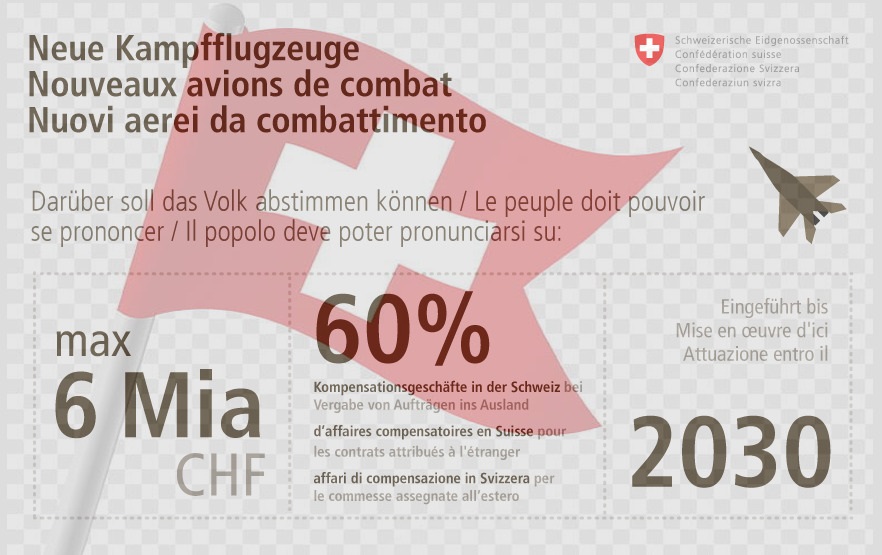True Democracy: the Swiss who even vote on the purchase of military aircraft

by Davide Gionco
Today, 27 September 2020, the Swiss people are voting in a referendum on the Federal Council's proposal to renew the air defense by investing 6 billion francs to purchase new fighter aircraft.
Let us ask ourselves: in Italy would it be possible to vote on the purchases of our army? Would we be interested in doing it as citizens?
Beyond the merit of the question, on which each of us, like every Swiss, can have their own free opinion, the referendum in question helps us to understand more deeply what it means to have a TRUE DEMOCRACY.
While we analyze how Democracy works in Switzerland, we make a comparison with Italy, to understand how we are very far from a true Democracy.
Beppe Grillo did not understand what Direct Democracy is
First of all, let's debunk the definition of Democracy given by Beppe Grillo.
Just a few days ago Beppe Grillo argued, like his party called Movimento 5 Stelle, that it is good for Democracy to reduce the number of parliamentarians, because the people must decide their own laws by themselves, through direct democracy.
But it is quite clear that no people in the world have the time to vote on any issue of political interest.
This is why modern democracies are REPRESENTATIVE DEMOCRACIES , in which some people are delegated by the people to decide on political issues. This mechanism allows a few people, even paid for their service, to devote the necessary time to LISTEN to the people, to DEEPEN the issues on which they have to decide, to COMMUNICATE to the people the issues they vote on.
So to think that the "people" should vote on everything means not realizing the reality. If this happened, in many cases people would not participate in the vote or would vote superficially, with no real understanding of the subject of the vote.
The quality of the decisions taken, consequently, would be rather poor.
There would therefore be a formally participatory democracy, but there would be no advantages for the people, who would have to invest a significant part of their time to inform themselves and to vote on too many political issues, while at the same time too many decisions would be wrong, given that many will have voted with no real understanding of the problems to be solved.
Direct Democracy is not an instrument in which the People take the place of Parliament, the regional, provincial or municipal council, but it is the POSSIBILITY that the People have to vote and IMPOSE on any decision made by the people that the People have delegated.
That is: it is evident that the risk in delegating decisions in the name of the People to a few people is that the delegates decide not for the collective interest, but for their own personal interest or of some private power.
The fact that there is the possibility for the People to impose themselves on the decisions of the delegates means that the delegates themselves, when they have to decide, do so with much more responsibility and attention to the needs of the People.
The people must be able to vote on any topic
Also in Italy we have the possibility to vote, through referendum, to repeal laws approved by Parliament.
However, the Italian people are prevented from voting on some fundamental issues. We quote from art. 75 of the Constitution:
“A referendum for tax and budget laws is not allowed [cf. art. 81 ], amnesty and pardon [cf. art. 79 ], for authorization to ratify international treaties [cf. art. 80 ]. "
Therefore any law that has relevance from an economic point of view is removed from the direct control of the people, as is any transfer of decision-making power of Parliament to supranational bodies, removed from popular control, which can decide in the interests of restricted groups of power. and indifferent to the will and destiny of the People.
It is no coincidence, in fact, that many of the current economic suffering of the Italian people derive from decisions taken by the government (with the condescending Parliament) for reasons of "financial discipline". And it is no coincidence that the decisions on cuts to the national health service , which caused many thousands of deaths in Italy from the Coronavirus pandemic, were actually taken in obscure Brussels offices and not by parliamentarians or regional councilors delegated by voters. Italians.
In Switzerland, however, they can vote on any subject. Citizens of a city can vote to prevent a city building permit, taxes to be paid, Switzerland's accession to an international treaty.
And this is a guarantee that it will be much more difficult for the strong powers to impose decisions on the People without fear of resorting to referendums.
The People must be informed
When the people are called to express themselves in a referendum it is essential that they are adequately informed on the matter.
In Switzerland, the Confederation itself guarantees this information, https://www.admin.ch/gov/it/pagina-iniziale/documentazione/se-ne-parla/Aerei_da_combattimento%20.html , presenting the point of view of those in favor and those opposed to the proposal.
If the People are not properly informed, which is absolutely "normal" in Italy, both on public and private televisions, as well as in the main newspapers, the People will risk making the wrong decision, perhaps the very decision on which the strong powers have invested , advertising it in the mass media.
Therefore, we cannot speak of true Democracy if there is no correct information on the subject of voting. Democracy is not just "voting", it is voting knowing what you are voting for.
The people must be able to make practical use of the referendum
In Italy, the impediments to recourse to Direct Democracy do not stop at the constraints of the Constitution (Article 75).
The number of signatures to be collected for a referendum subscription is established by an ordinary law, which the parties can modify as they wish, increasing the number of signatures necessary and making the conditions for their validation and for their filing with the Court more difficult. of Cassation.
To be clear: in Switzerland anyone can collect signatures on forms that can be downloaded from the internet. These signatures are then subjected to the validity check of a municipal official, who knows the original signature of the residents in the municipality, since it was affixed at the time of issuing the identity document.
So there are no margins for fraud, while there is all the ease of collection without having to bring (for a fee) a notary into the square or without needing the availability of an "elected" (in Italy those elected as councilors or deputies have the right to validate signatures).
This difference is not insignificant and prevents many citizens' committees from collecting signatures to bring the questions to a referendum vote.
People can be wrong and can be corrected
Many, too many elected officials in Italy think that Italians are a mass of ignorant people, unable to decide. And, as a result, they "take responsibility" to vote without worrying about what their constituents think.
In Switzerland, on the other hand, it is the voters who take their responsibility for deciding.
Politicians, of course, can act to inform citizens, but ultimately they have to accept the outcome of the votes.
It may happen that the people are wrong to vote. After a few years, after the citizens have realized this, another referendum committee will be born to propose the modification of that law.
This is Democracy.

Thanks to our Telegram channel you can stay updated on the publication of new articles of Economic Scenarios.
The article True Democracy: the Swiss who even vote on the purchase of military aircraft comes from ScenariEconomici.it .
This is a machine translation of a post published on Scenari Economici at the URL https://scenarieconomici.it/la-vera-democrazia-gli-svizzeri-che-votano-persino-sullacquisto-di-aerei-militari/ on Sun, 27 Sep 2020 07:40:27 +0000.

